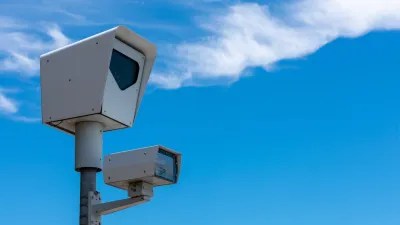If it's successful, a public-private partnership between Microsoft and the city of Bellevue, Washington could produce Minority Report-style predicative capabilities to prevent bike crashes.
Lisa Stiffler reports: "Microsoft engineers and City of Bellevue planners have a sci-fi inspired strategy for curbing bike and pedestrian injuries on city streets: By using video analytics, they want to predict and prevent crashes before they happen."
Yes, that statement implies some Minority Report-style clairvoyance—Bellevue senior transportation planner Franz Loewenherz invokes the 2002 Tom Cruise film directly in a direct quote: "This is like ‘Minority Report….We’re trying to get out in front of the collisions. We can take a corrective measure before someone gets hurt."
Stiffler explains how the system works: the city shares footage from its system of traffic cameras with scientists from Microsoft, who "are developing software for analyzing the footage, identifying whether a car, bike or pedestrian is using a street or sidewalk, their rate of speed and their trajectory." Then the Microsoft team writes algorithms "to look for potential collisions and near misses in order to identify dangerous intersections and roads."
The article includes a lot more about how the project is proceeding, and what it hopes to achieve by crunching the numbers on so much video footage. One noteworthy tool of the process is a WikiMap, now closed to commenting, "encouraging people to mark roads and infrastructure that they believe are dangerous." The map accrued more than 1,200 data points in its first month of operation.

Alabama: Trump Terminates Settlements for Black Communities Harmed By Raw Sewage
Trump deemed the landmark civil rights agreement “illegal DEI and environmental justice policy.”

Planetizen Federal Action Tracker
A weekly monitor of how Trump’s orders and actions are impacting planners and planning in America.

The 120 Year Old Tiny Home Villages That Sheltered San Francisco’s Earthquake Refugees
More than a century ago, San Francisco mobilized to house thousands of residents displaced by the 1906 earthquake. Could their strategy offer a model for the present?

In Both Crashes and Crime, Public Transportation is Far Safer than Driving
Contrary to popular assumptions, public transportation has far lower crash and crime rates than automobile travel. For safer communities, improve and encourage transit travel.

Report: Zoning Reforms Should Complement Nashville’s Ambitious Transit Plan
Without reform, restrictive zoning codes will limit the impact of the city’s planned transit expansion and could exclude some of the residents who depend on transit the most.

Judge Orders Release of Frozen IRA, IIJA Funding
The decision is a victory for environmental groups who charged that freezing funds for critical infrastructure and disaster response programs caused “real and irreparable harm” to communities.
Urban Design for Planners 1: Software Tools
This six-course series explores essential urban design concepts using open source software and equips planners with the tools they need to participate fully in the urban design process.
Planning for Universal Design
Learn the tools for implementing Universal Design in planning regulations.
Clanton & Associates, Inc.
Jessamine County Fiscal Court
Institute for Housing and Urban Development Studies (IHS)
City of Grandview
Harvard GSD Executive Education
Toledo-Lucas County Plan Commissions
Salt Lake City
NYU Wagner Graduate School of Public Service




























